
The hormonal and physiological changes during pregnancy can affect how your body digests dairy. Many pregnant women who experience an upset stomach always bloating, gas, or discomfort after consuming dairy wonder, “Can you become lactose intolerant during pregnancy?”.
At Milktab, we understand that some women may become lactose intolerant at certain times, especially during pregnancy. That’s why we’ve devised a solution to help you enjoy dairy consumption without discomfort. Our lactase pills are formulated to support digestion through triple the lactase enzyme (27,000 FCC units) and two other enzymes, protease and lipase. They fit your wallet for convenient use wherever you may be.
With our years of research, we’ve crafted this guide to help you understand how lactose intolerance can develop during pregnancy and offer practical solutions. By the end, you will know the answer to “Can you become lactose intolerant during pregnancy?” and how to address it effectively.
Let’s dive in!
Lactose Intolerance and Pregnancy
During pregnancy, some women may develop new food sensitivities, including lactose intolerance, even if they previously had no issues with dairy. Understanding how these dietary changes occur is crucial for managing symptoms and maintaining comfort. How can you become lactose intolerant during pregnancy? Let’s explore below.
Hormonal Changes and Digestive Sensitivity
Sure enough, it's natural for hormone levels to fluctuate within pregnancy, and it is bound to affect various body systems, which include digestion. Increased progesterone, for instance, can often affect gut motility, which raises some questions about whether or not pregnancy can cause lactose intolerance.
Here's how changes in hormone levels, such as progesterone, could affect gut motility, resulting in slower and more complicated digestion:
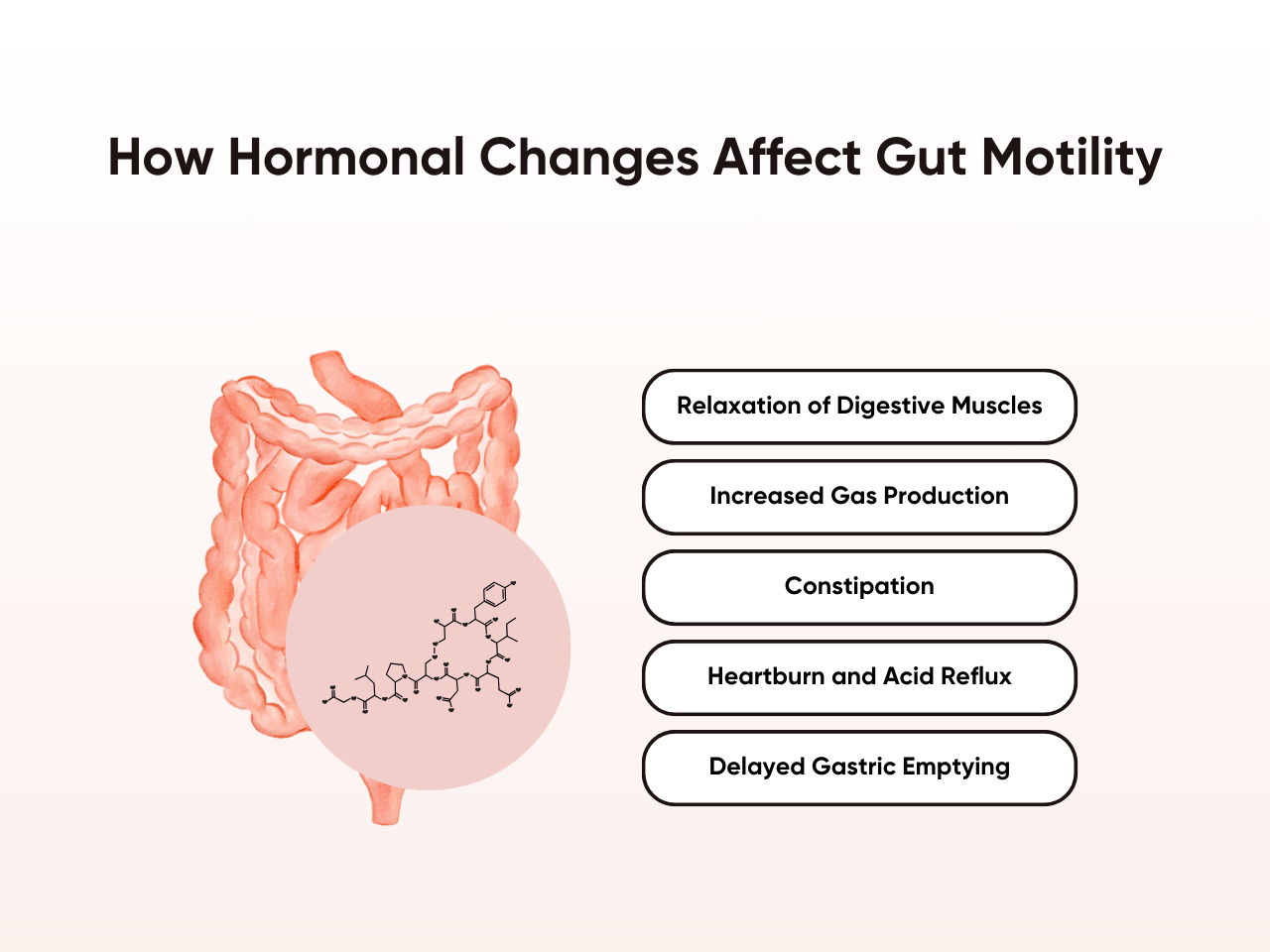
- Relaxation of Digestive Muscles: Progesterone relaxes digestive tract muscles, slowing gut movement. This can lead to bloating and stomach pain.
- Increased Gas Production: Slower digestion causes the accumulation of more gas in the intestines, leading to flatulence or bloating.
- Constipation: The body tends to digest slower with constipation. Water in the food is absorbed more, which makes stools hard. This is a common phenomenon during pregnancy.
- Heartburn and Acid Reflux: The hormonal change also weakens the valve between the stomach and esophagus, sometimes causing an acid backflow. This results in acid reflux or heartburn.
- Delayed Gastric Emptying: Food stays in the stomach longer, leading to a feeling of fullness or nausea. This can make meals feel heavier and more uncomfortable during pregnancy.
Temporary Lactose Intolerance During Pregnancy
While a female might experience lactose intolerance during pregnancy, this is likely only temporary. Hormonal changes and effects on digestive function may create new sensitivities to dairy. Often, these issues improve after childbirth as hormone levels stabilize and digestive function returns to normal. This answers the question, “Can you become lactose intolerant during pregnancy?” and provides insight into how these changes affect dairy tolerance.
However, in some cases, lactose intolerance might be enduring past pregnancy if a medical disorder causes it or if it is not fully recovered from the digestive system. Watch for the pregnancy symptoms and report to your provider to check whether the intolerance is temporary or permanent.
How Pregnancy Exacerbates Pre-Existing Conditions
Pregnancy is likely to exacerbate any existing conditions, which leads to some women wondering, “Can you become lactose intolerant during pregnancy?”. During pregnancy, the difference in bile acidity can affect lactose intolerance or any other digestive issues. Here, we discuss how these already present health issues worsen during pregnancy.

- Increased Hormonal Fluctuations: There are numerous imbalances in the body during gestation, one being hormonal fluctuation, which can aggravate any already present conditions.
- Altered Gut Functionality: Pregnancy can retard an individual’s gut function, which eventually worsens preexisting digestive conditions. This leads to the patient suffering more excruciating pain and inconvenience.
- Increased Stress: For most women, pregnancy is a huge stressor itself. Many gestational conditions are associated with the co-exacerbation of other medical conditions.
- Nutritional Needs: Pregnancy increases the need for nutrients, which impacts existing conditions. Lowered dietary intake or higher consumption of specific foods may worsen lactose intolerance.
- Immune System: Pregnancy changes the immune system. These changes prevail in conditions that may predispose to higher sensitivity or worsening of symptoms regarding lactose intolerance or other digestive issues.
Recognizing the Symptoms of Lactose Intolerance During Pregnancy
During pregnancy, the digestive system can be more sensitive to certain foods, possibly including dairy, which may lead to lactose intolerance symptoms. Now, let's take a closer look at some guidelines to see if can you become lactose intolerant during pregnancy.
Distinguishing Lactose Intolerance from Other Pregnancy Digestive Issues
To determine whether can you become lactose intolerant during pregnancy, pay attention to your reactions to dairy products. Pregnancy can cause various digestive changes, making it difficult to pinpoint the exact cause of discomfort. However, sure signs can define the problem of lactose intolerance. Here's how to identify whether the symptoms are due to lactose intolerance or other pregnancy-related factors:
- Bloating and Gas: Lactose intolerance often causes more severe bloating and gas shortly after consuming dairy products compared to general pregnancy-related bloating.
- Diarrhea: Chronic diarrhea following dairy consumption can be a sign of lactose intolerance. While pregnancy can also cause diarrhea, it typically coincides with other abdominal discomfort.
- Abdominal Cramping: Abdominal pain and cramps after consuming lactose-containing foods may indicate lactose intolerance. Pregnancy-related cramps are usually less specific to food intake.
- Nausea: Nausea after eating dairy products may suggest lactose intolerance. Pregnant women are also prone to nausea, but it is more commonly associated with morning sickness rather than specifically with dairy intake.
- Timing of Symptoms: Symptoms of lactose intolerance typically occur within hours of consuming dairy, whereas common pregnancy gastrointestinal complaints are not food-related and are less predictable in timing and severity.
Monitoring Your Diet and Symptoms
It’s important to carefully monitor your diet and symptoms to determine if can you become lactose intolerant during pregnancy. Keeping track of what you eat and how your body reacts can help identify food triggers. This is very helpful in distinguishing lactose intolerance from general pregnancy discomfort. Below, let’s explore how to do it effectively:
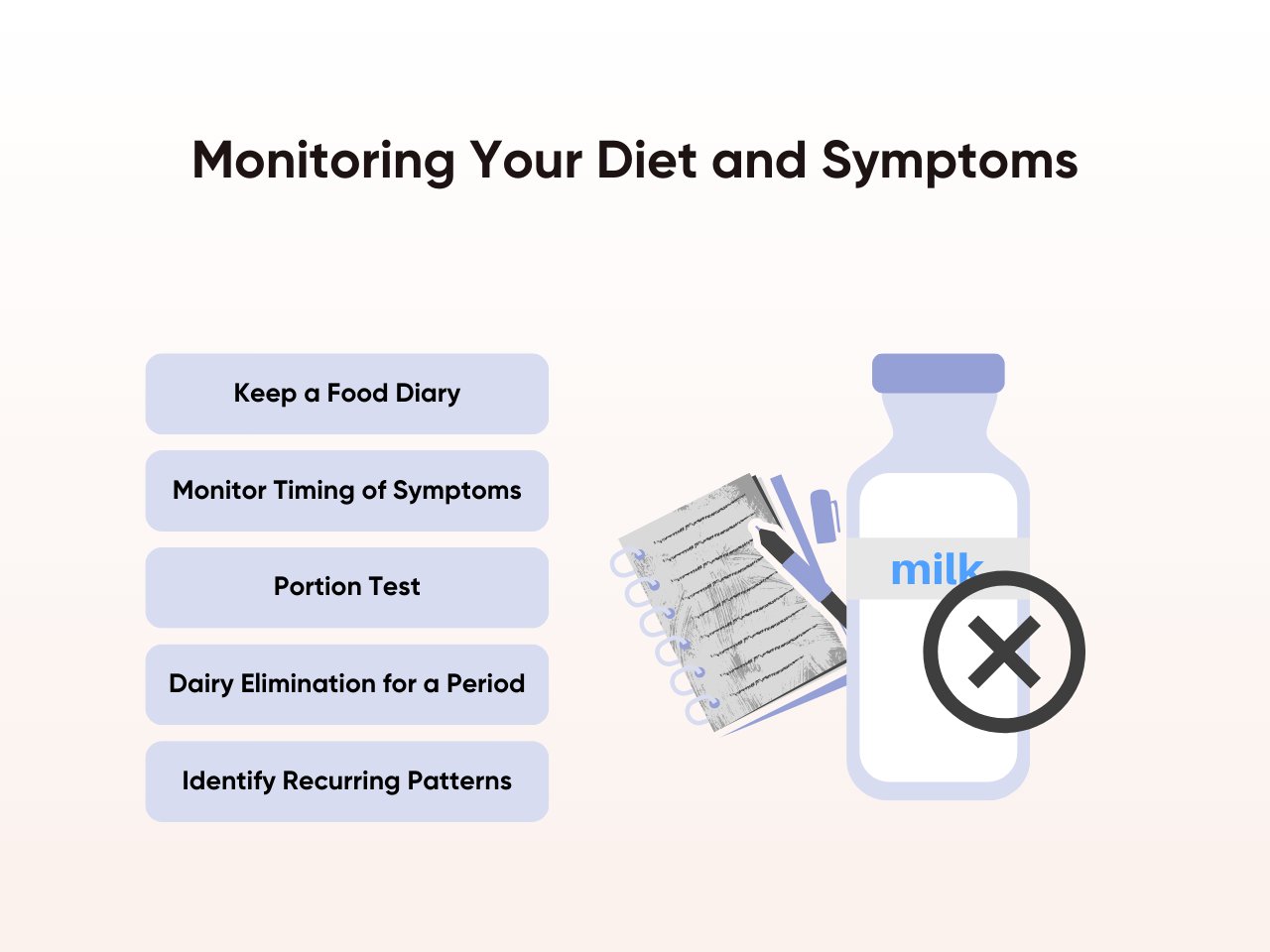
- Keep a Food Diary: Record everything you eat and drink and any symptoms you experience later to pinpoint if you become lactose intolerant during pregnancy.
- Monitor Timing of Symptoms: Track when symptoms, such as bloating or gas, appear after consuming dairy products. In lactose-intolerant patients, discomfort typically begins within 30 minutes to 2 hours after lactose intake.
- Portion Test: Self-administer tiny quantities of dairy products to observe if the symptoms are well borne. Some lactose-intolerant individuals may tolerate small amounts without discomfort.
- Dairy Elimination for a Period: Eliminate all dairy products from your diet for a week to see if your symptoms improve. Then, gradually reintroduce the dairy and monitor your body’s response.
- Identify Recurring Patterns: Pinpoint consistent symptoms occurring after dairy consumption. If symptoms occur every time you consume dairy, it may indicate that you become lactose intolerant during pregnancy.
Consulting with a Healthcare Professional
Consulting a healthcare professional is the best way to know if can you become lactose intolerant during pregnancy. They can help assess your symptoms and determine if they relate to lactose intolerance or other pregnancy-related digestive issues. That way, you ensure you get the proper counseling about your diet and health. When consulting with a healthcare provider, discuss the following:
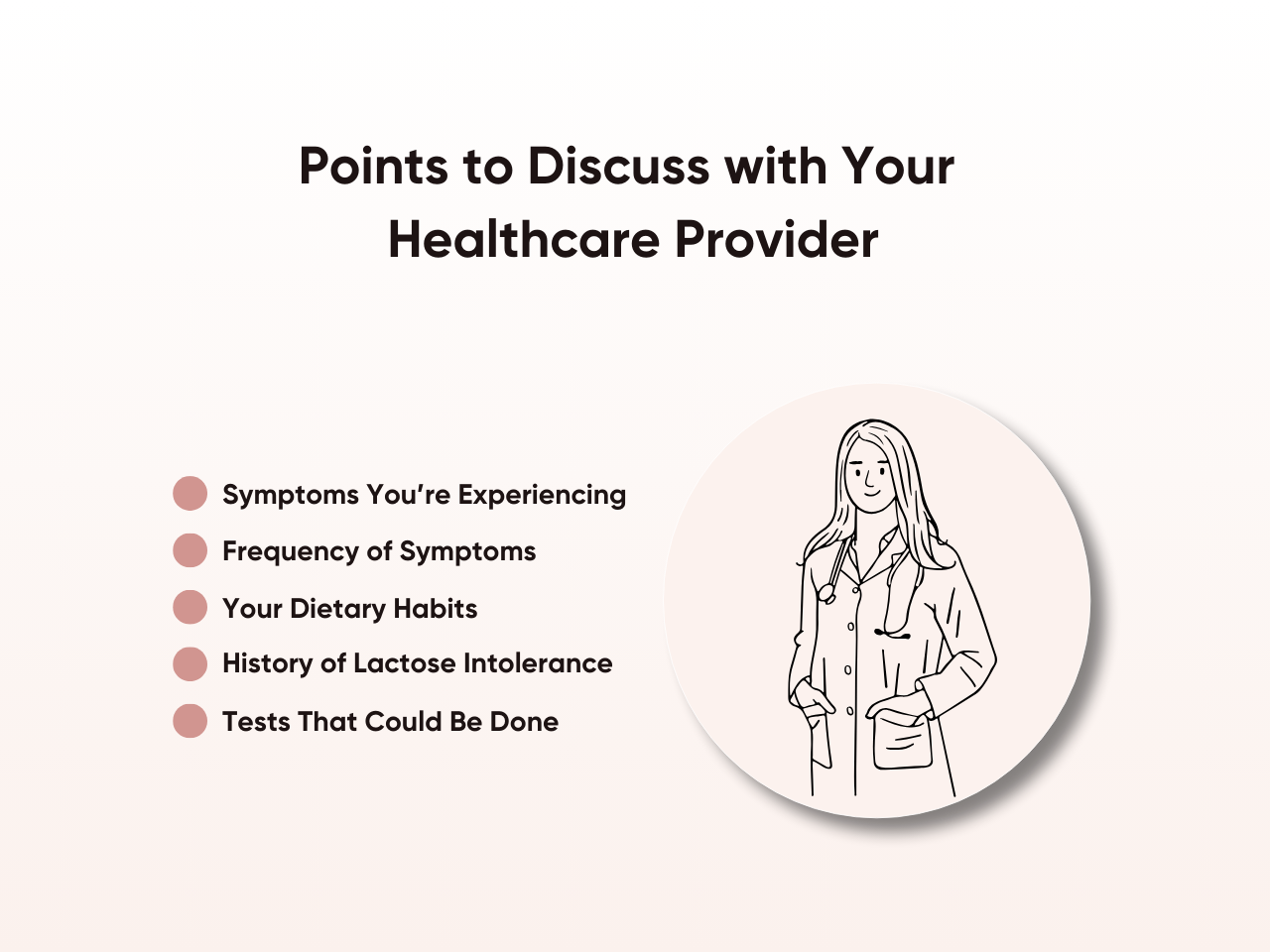
- Symptoms You’re Experiencing: Describe when you have bloating, gas, or crampy abdominal discomfort after ingesting dairy to help your doctor identify patterns linked to lactose intolerance.
- Frequency of Symptoms: Inform your doctor how often you experience these symptoms. Persistent episodes after dairy intake are an essential sign of lactose intolerance.
- Your Dietary Habits: Provide details about what you usually take and what kind of dairy to help your doctor understand your dietary habits and provide suitable alternatives.
- Family History of Lactose Intolerance: Inform your doctor if any family members have lactose intolerance, as it may be genetically predisposed and could manifest during pregnancy.
- Tests That Could Be Done: For a more distinctive diagnosis if you become lactose intolerant during pregnancy, ask about lactose intolerance tests, such as the hydrogen breath test or an elimination diet.
Managing Lactose Intolerance During Pregnancy
Pregnancy nutrition becomes complex when you become lactose intolerant during pregnancy. It is important to ensure that you and your baby receive all the necessary nutrients without causing discomfort due to lactose intolerance. Consider these guidelines on how to live with lactose intolerance during pregnancy while maintaining proper nutrition intake.
Lactose-Free Dairy Alternatives
Look for lactose-free dairy alternatives to satisfy your nutritional requirements while pregnant. These alternatives provide the necessary nutrients without discomfort in your digestive system. Here is a list of some of these lactose-free dairy alternatives:
Lactose-Free Yogurt
- Greek-Style Yogurt: Although Greek yogurt may contain some lactose, the straining process involved in making it may result in lower levels of lactose compared to regular yogurt.
- Coconut Yogurt: Made from coconut milk, this dairy-free alternative is free from lactose.
- Soy Yogurt: As a plant-based product made from soy milk, soy yogurt does not contain lactose.
- Almond-based Yogurt: Almond yogurt is manufactured from almond milk without dairy or lactose.
- Cashew Yogurt: Cashew yogurt is produced from cashew milk that is wholly plant-based and does not contain any lactose.
Lactose-Free Cheese
- Cheddar: All in all, it is a low-lactose cheese due to its aging process.
- Mozzarella: Even though there will still be some lactose in fresh mozzarella, aged mozzarella will have much less.
- Parmesan: Very low in lactose due to its long aging process.
- Feta Cheese: It usually has a medium level of lactose, but this depends on how it is made.
Lactose-Free Milk
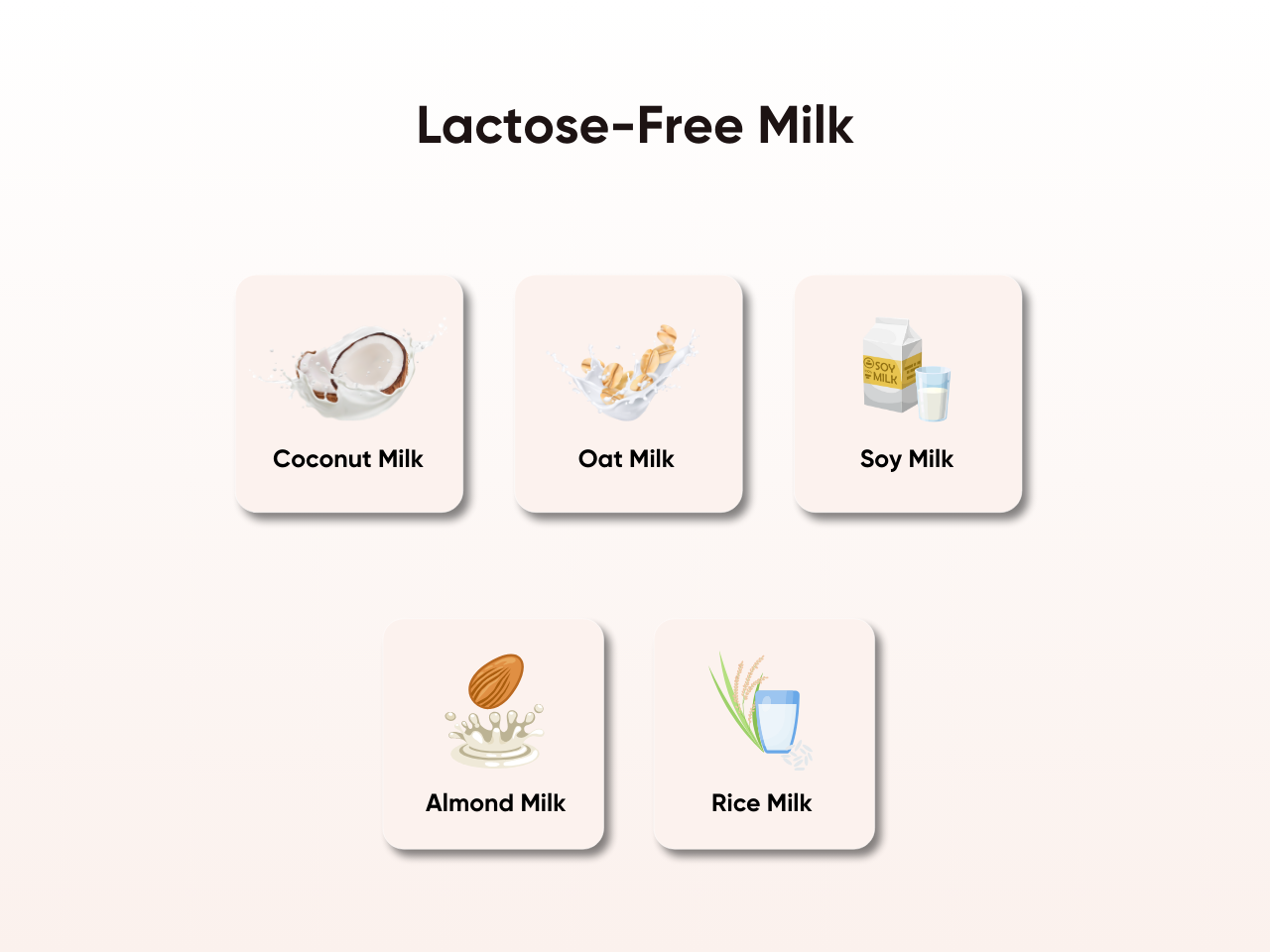
- Coconut Milk: Derived from coconut meat, coconut milk is both dairy and lactose-free.
- Oat Milk: Made from oats and water, oat milk is a plant-based alternative that is free from lactose.
- Soy Milk: Extracted from soybeans, soy milk is a lactose-free option.
- Almond Milk: Almond milk comes from almonds and contains no lactose.
- Rice Milk: Rice milk is plant-based milk extracted from rice and water without lactose.
Incorporating Calcium-Rich Foods
Consuming calcium-rich foods is essential for managing lactose intolerance during pregnancy. Enough calcium is necessary for developing fetal bones and teeth and helps preserve a woman's bone health strength. All the necessary calcium can easily be acquired from non-dairy sources if one avoids dairy.
Leafy greens like spinach and kale also make for an excellent source of calcium. Nuts, especially almonds, can also be used for calcium and healthy fats. Finally, calcium-fortified plant-based almond or soy milk can be an excellent addition.
Using Lactase Supplements
Taking a dairy digestive supplement right before consuming dairy can help manage when you become lactose intolerant during pregnancy. Lactase supplements contain an enzyme that breaks down lactose in dairy products. These are the ways that lactase can help women digest lactose without really experiencing the symptoms even as they continue consuming dairy:
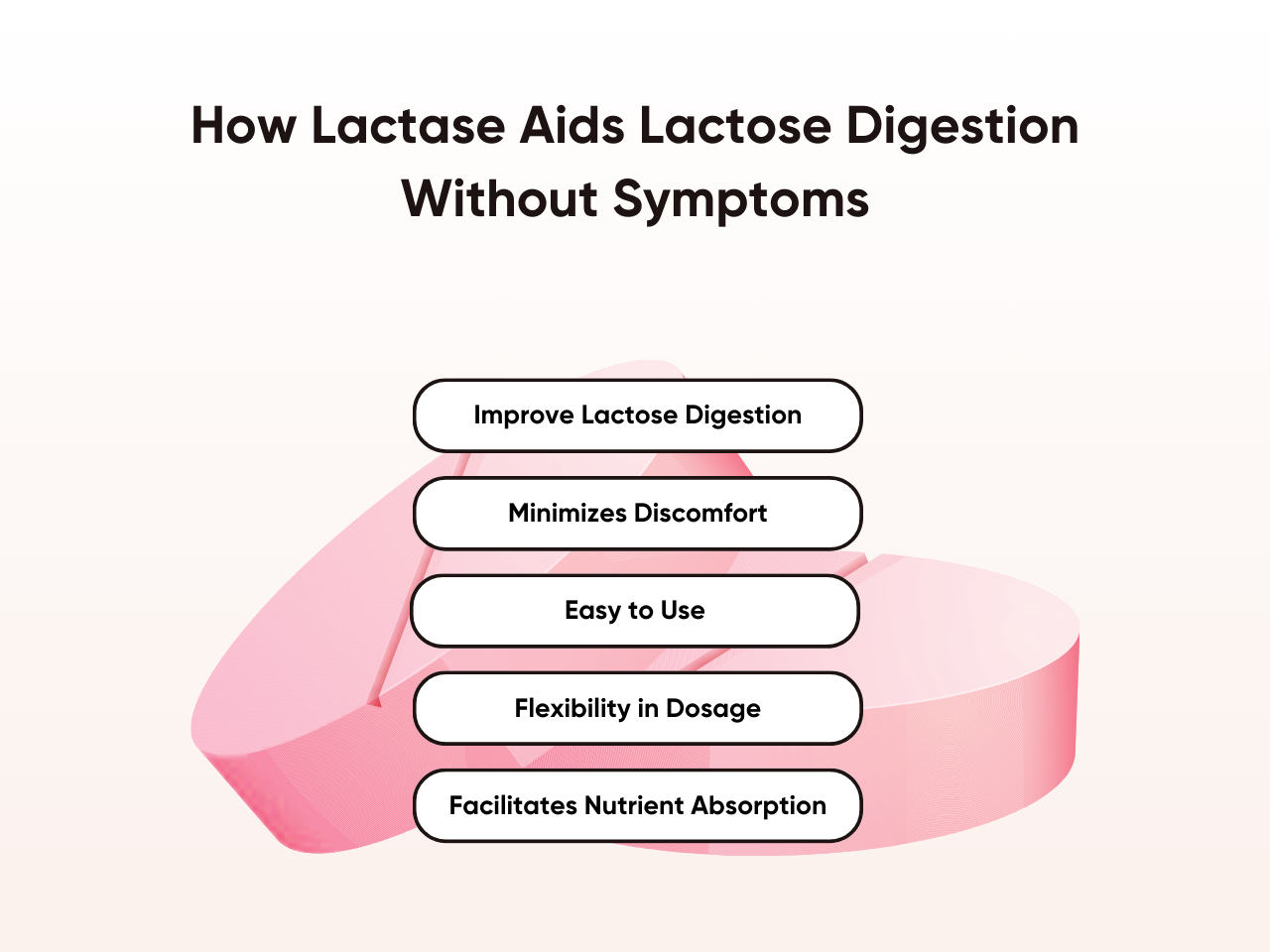
- Improves Lactose Digestion: Lactase supplements induce breakage of lactose in the digestion system and further allow easier digestion of dairy products. Such occurrences can relieve common symptoms, such as bloating and gas.
- Minimizes Discomfort: By supporting lactose digestion, it reduces discomfort when one is lactose intolerant, making the consumption of dairy products less uncomfortable.
- Easy to Use: Lactase supplements are taken quickly and, most often, as a pill or lactase chewable tablet before consuming dairy. This simplicity makes it convenient to include dairy in your diet.
- Flexibility in Dosage: Strengths are available in various dosages, so you can adjust them according to your tolerance. The whole treatment would then be tailored according to your needs.
- Facilitates Nutrient Absorption: Lactase supplements allow you to enjoy dairy, which provides your body with vital nutrients such as calcium and vitamin D. These are especially critical during pregnancy because they help maintain your body's health and your baby's development.
Key Takeaway
Knowing if can you become lactose intolerant during pregnancy is essential in managing your health and comfort levels. Pregnancy can alter how your body works, affecting how you digest dairy. In many cases, you will pick up on these changes and distinguish them from other problems with your digestion.
Including other calcium and dairy relief pills, you can maintain a healthy diet without discomfort or inconvenience. You may also consider consulting with healthcare professionals to provide further guidance tailored to your needs. Adapting your diet and lifestyle is important to ensure you and your baby remain healthy.
Struggling with digestive discomfort from lactose intolerance during pregnancy? Milktab offers a practical solution with our lactase pills, designed to help you enjoy dairy without the usual symptoms. Connect with us at contact@milktab.co and try Milktab today to savor your favorite dairy products easily and comfortably.